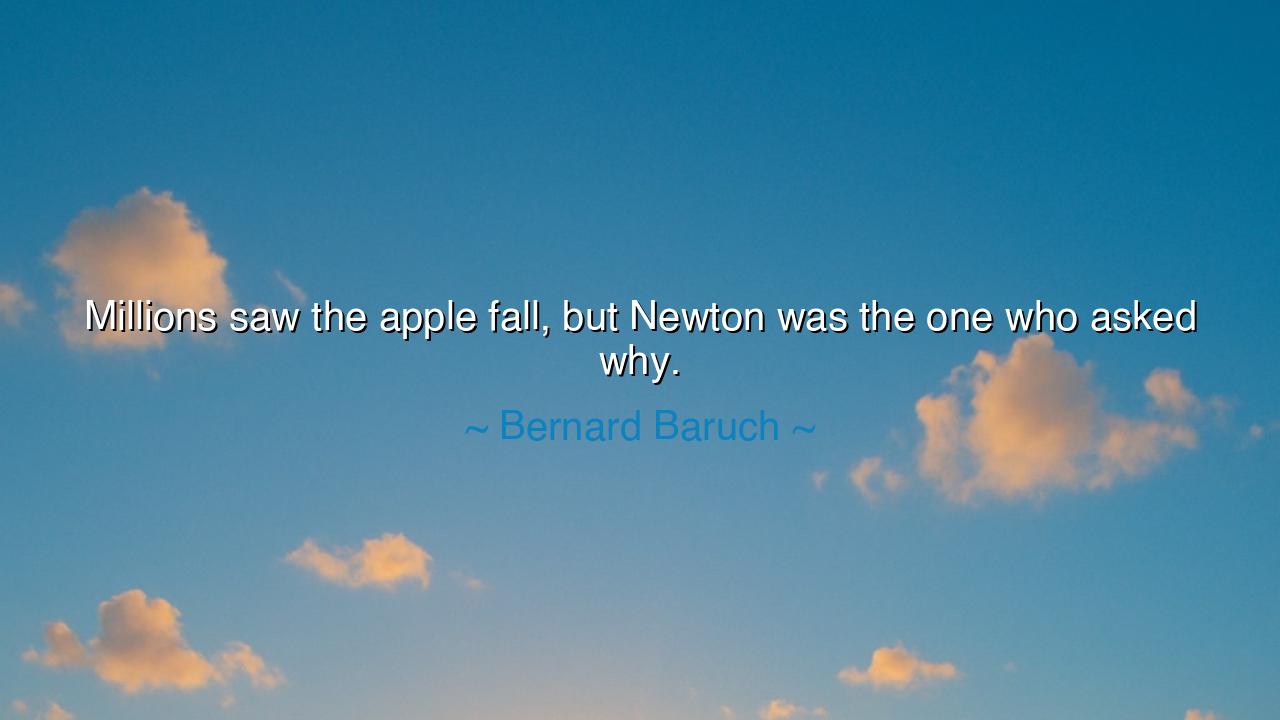
Millions saw the apple fall, but Newton was the one who asked






“Millions saw the apple fall, but Newton was the one who asked why.” Thus spoke Bernard Baruch, a man of deep intellect and worldly wisdom, who understood that the difference between greatness and mediocrity lies not in what one sees, but in what one questions. His words are an ode to the spirit of inquiry, the divine spark that separates the observer from the thinker, the follower from the visionary. For the world is filled with eyes that see, yet few are the minds that seek to understand. It is the question—“why?”—that opens the gates of discovery and transforms the ordinary into the miraculous.
The tale of Isaac Newton and the falling apple is among the most celebrated in the history of human thought. Countless men and women before him had watched apples tumble to the ground, and none thought twice about it. But when Newton beheld that simple fall, something stirred within him—a restlessness of mind, a hunger for reason. He did not accept the motion as mere chance. He asked why, and in that question lay the birth of a revolution. From that single inquiry emerged the law of gravity, a force that binds the stars in their orbits and the oceans to the shore. What millions overlooked as common, Newton transformed into cosmic truth.
Bernard Baruch, a statesman, financier, and philosopher of the twentieth century, understood this principle not only in science but in all endeavors of life. His words remind us that genius does not come from privilege or opportunity alone—it springs from curiosity. The world offers its wonders freely to all, but only those who question it with courage and persistence will uncover its secrets. For the mind that asks “why” is the mind that refuses to sleep, that rebels against ignorance, that hungers for light in a world too content with shadow.
This truth is as old as civilization itself. Consider Galileo Galilei, who looked upon the heavens through his telescope and dared to ask why the planets moved as they did, even when the powerful forbade such questions. Or Socrates, who asked why men claimed to know what they did not know, and for that question paid with his life. These were not men of comfort—they were seekers of truth. They proved that the path of wisdom begins not in certainty, but in wonder. As the ancients taught, the one who asks begins to see what others overlook; and in seeing, he begins to change the world.
Yet this wisdom is not reserved for scholars or sages. Every human soul holds the power of Newton’s apple—the power to question, to wonder, to see beneath the surface of things. Most look upon the world and say, “It is what it is.” But the thinker, the creator, the leader, looks upon the same world and whispers, “What could it be?” The true measure of intelligence lies not in knowing, but in seeking. For the one who never asks “why” lives asleep beneath the sky; the one who dares to ask awakens and begins the climb toward truth.
But to ask “why” requires courage, for every question is a challenge to the comfort of ignorance. Many fear the question because it disrupts the peace of the familiar. To inquire is to admit that we do not yet understand—and pride resists such humility. Yet it is humility that opens the mind to knowledge. The great innovators, the discoverers, the reformers of the world were all humble before mystery. They were not content to see—they yearned to know. Thus, Baruch’s words are not only a tribute to Newton but a commandment to us all: look deeper, ask boldly, never accept the world at face value.
Therefore, O seeker of truth, make questioning your compass. When you behold the ordinary, search for the extraordinary within it. When life seems fixed, ask why it cannot change. When others see only what is, train your mind to glimpse what might be. Let every challenge, every failure, every moment of wonder become an apple falling before your eyes. And when it does, do not walk away. Pause. Think. Ask why. For that question is the spark that ignites the fire of progress, the thread that leads from ignorance to illumination.
The lesson is clear: The world is filled with those who see—but it advances only through those who question. Be among them. Cultivate the restless mind, the curious heart, the spirit that will not settle for surface truths. For as Bernard Baruch taught through the story of Newton, it is not the apple that changed the world—it is the question that followed it. And the one who dares to ask “why” today will be the one who leads humanity to where it has never been before.






AAdministratorAdministrator
Welcome, honored guests. Please leave a comment, we will respond soon